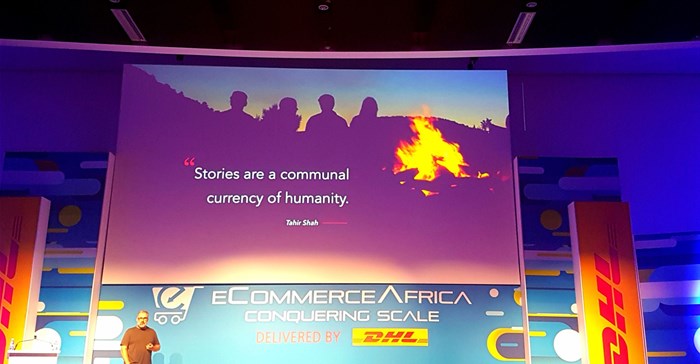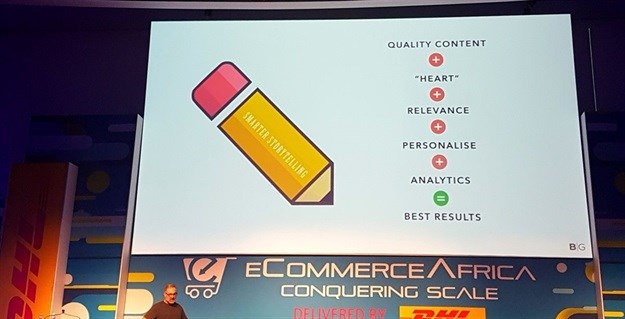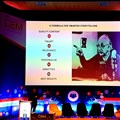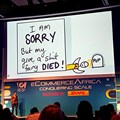In a talk titled 'Why your story matters', in the driving demand track of the fifth eCommerce Africa conference, attendees heard from Mike Joubert, founder of the Billybo Group. Dubbed a godfather in SA brands and marketing, he walked us through the virtue of storytelling and why it matters, while shedding light through examples from some of the greatest commercial stories ever told.

Mike Joubert of the Billybo Group, in action on the eCommerce Africa 2019 stage.
Joubert is a master storyteller himself, who could easily have kept the audience riveted for more than his allocated half-hour slot through his engaging style - that's what any brand aspires to, but Joubert convinced us over the course of his presentation that with the right storytelling skills and passion for your brand and customers alike, anyone can become a better storyteller.
Joubert presented just a sliver of stats, with the bulk of his presentation serving as an inspiration to relook at who you are as a brand, and how you tell your story.
Despite or perhaps because of technological advancement, Joubert said to keep in mind themes of simplicity, as well as the power of relevance, and the necessity of including emotion in the stories you tell.
After all, we've experienced but a tiny blip of the overall time of our 14bn+-year-old universe, yet throughout the rapid changes we've faced, history has survived from the simple tradition of telling stories around the fire.
Don't underestimate the power of a story in your brand communication
No matter the language, great stories work when there's an emotional aspect. To demonstrate this, we watched the following:
Joubert commented that even if you have no understanding of the Turkish language, the ad works as the story is clear and served a purpose.
Seth Godin’s definition of a brand’s value is one of the best Joubert has seen so far, but he admits that it’s easier said than done to start telling your brand story:
A brand's value is merely the sum total of how much extra people will pay, or how often they choose, the expectations, memories, stories and relationships of one brand over the alternatives.
We tend to want to tell people what we do instead of who we are.
Make your brand more human: Tell people who you are
Joubert adds that Simon Sinek famously postulated the need to ask why, but we often forget to first ask 'who'. It's important to include this information on your website for customers to see, as well as in the form of a manifesto for any new employees to understand and buy into your brand story.
This has never been more relevant, with Nielsen's three-year study on trust in advertising showing that young people (those under the age of 25) expect meaning when they buy from a brand and they relate their purchases to your brand purpose; it’s social capital.

Joubert's summary slide at eCommerce Africa 2019.
Think no further than Coca-Cola for brands that do this well - they aim to serve joy and happiness.
But Joubert says marketing has become too important to be left just to marketers, and in most companies, the organisational structure of the marketing function hasn’t changed since the concept of brand management first emerged. Many agencies now embrace specialisation to such an extent that the work becomes repetitive, so we all need to work harder to tell a new story that resonates, even - especially - if you're an existing brand.
But it can be overwhelming. How does your brand's storytelling stand out, when so many brands are trying to do so?
You put your left brain in, you put your right brain out...
Joubert likens this to the 'left brain-right brain' business paradox.
For the left-brain, the numbers of the business form the backbone of what you do, but the often ignored soft science of storytelling from the right brain is also crucial, as Daniel Pink explained in his book, A Whole New Mind: Why Right-Brainers Will Rule the Future:
The future belongs to a different kind of person with a different kind of mind: artists, inventors, storytellers, creative and holistic 'right-brain' thinkers.
That said, you need a compelling, emotional reason to change consumer behaviour. To demonstrate this, Joubert showed the following example of "a beautiful story on a taboo subject,", which emphasises the 'beyond the bottom line' idea that when times are difficult, you need to show you’re not just in business to make money but also to convey positivity and change in the world.
But Joubert wants you to keep the momentum going, as one effective ad isn't enough, the mind assimilates all your brand storytelling over time, to form an overall picture.
Is there a clear narrative, beyond the copy? Is it short and simple and not just trying to tell but to also show?
Remember that great stories don't have to have words and that design devices like hashtags are extremely powerful in brand communication as consumers can join in with your story.
On telling B2B stories, Joubert said this form of storytelling is often at its finest as you get to combine functional selling in an emotional way. Just think of Volvo Trucks' 'Epic split campaign:
Or how about this - super-effective and Super Bowl-size budget aside, it's a case of storytelling at its best:
Joubert concluded that in honing our storytelling skills, we should engage with heart and convert with smart, especially if you keep in mind you're not just dealing with 'a customer' - that customer is a person, who wants to know your brand story. Tell it well.
So decide on your brand's 'who' then find your 'why' and tell that story with gusto. Remember to watch the #ecommerceconfex hashtag for updates from the eCommerce Africa 2019 conference.



















































